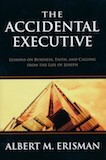The Businessman and the Fisherman
Blog / Produced by The High Calling
Editor's Note: The Young Professionals channel is exploring four obstacles that often hinder the integration of work and faith. This week, we're discussing Money.
“Anekdote zur Senkung der Arbeitsmoral” has been on my mind since the morning I ate breakfast with Carl Lundblad. Carl works for a bank. His bank has thousands of employees and he works near the top, which means he knows something about both money and business. And Carl is a Christian, having grown up under the influence of missionary grandparents and a pastor father. These two components—work and faith—come together for Carl in a rather interesting way.
Before I tell you how, let me tell you about “Anekdote zur Senkung der Arbeitsmoral,” or, “The businessman and the fisherman.” A popular version goes something like this:
A fisherman was lying in the warm afternoon sun on a beautiful beach, with his pole propped up and his line cast out into the water. An energetic businessman walked by.
“You aren’t going to catch many fish that way,” said the businessman to the fisherman. “You should work harder.”
The fisherman looked up and good-naturedly asked, “And what would I get for that?”
The businessman replied that he would catch more fish, sell them for more money, save the surplus, and invest in a boat and nets, which would let him catch even more fish.
Again the fisherman asked, “And what would I get for that?”
Somewhat impatiently, the businessman explained that he could then reinvest the even greater surplus and buy more boats and hire staff, becoming a small business and catching ever more fish.
Again the fisherman asked, “And what would I get for that?”
Now the businessman lost it. “Don’t you understand that you can become so rich that you never have to work for a living again? You could spend the rest of your days sitting on this beach, just enjoying this sunset!”
The fisherman’s eyes lit up. “And what do you think I’m doing right now?”
(As told by Andreas Kluth, who traces the story's roots here.)
I’ve been thinking about this story because, in a way, I see Carl in both men. He is the businessman—minus the greed. And he is the fisherman—minus the laziness. It is a worthy combination, this mix of entrepreneurial acumen on the one hand, and freedom from Golden Handcuffs on the other.
Case in point: As a young professional working in a law firm, one of the older partners said, “Carl, you didn’t buy a big enough house.”
“What do you mean?” he asked.
“Well,” the partner replied, “I want you to have a nice big mortgage so that you’ll have to work hard for us.”
Notice where the visionary businessman unites with the unshackled fisherman. Carl had been guided by advice a mentor gave him years before, who said, “Always live beneath your means. If you don’t, you’ll never have the freedom to walk away.” With the low mortgage, Carl was able to do just that: leave the firm—at a very significant pay cut—to join a company that he believed in.
Carl has lived by this motto for years. “I don’t want to just live below my means so that I can give more, but also to live with the freedom to make choices.”
But Money Did Play a Role
I remembered a choice he had to make more recently. “Carl, you considered leaving the corporate world altogether and following your family's footsteps in overseas ministry. What role did money play in your decision to stay?” (Katherine Leary Alsdorf lists four obstacles that often hinder the integration of work and faith; I was trying to push Carl into confessing a hang-up with the first one: money. He didn’t budge.)
He said, “I had to ask myself, ‘What is my call?’ I’ve asked the question a hundred times, but it only really counts in moments like these, you know? And the answer, again, was that—at least for right now—I’m supposed to be here…doing this work in a way that honors God. My job as Chief Legal Officer is to keep us accountable and to help us make wise decisions as a financial institution.”
“But money did play a role,” he continued. “And it still does. Having been raised in a ministry-oriented family—in the traditional sense of the word ‘ministry’—I struggle sometimes to enjoy what God has provided. In fact, I have more guilt about enjoying money than not.”
I asked what he does about that guilt.
“Every time I’d get a bonus, I’d tithe and pay down a loan, or put some in savings—whatever was needed—and then I’d buy a little something I wouldn’t ordinarily buy for myself. Once it was a leather jacket. I try to strike the balance of I Timothy 6:17: ‘Command those who are rich in this present world [That's most of us in this country, by the way] not to be arrogant nor to put their hope in wealth, which is so uncertain, but to put their hope in God, who richly provides us with everything for our enjoyment.’”
There it is again: that mix of the businessman and the fisherman: Work hard to make money, but hold it loosely. Set your mind on the future, but put your hope in God. “Carl, what is it about money that threatens this balance?”
“Life was so much simpler when my wife and I were just out of school and trying to get by. We didn’t have a lot of choices then. And it was easier to rely on God. But like a business that might have a run of success, or the environment we experienced during the tech and housing bubbles, more resources tends to create a false sense of security—even a kind of invincibility.”
“I hope you hold onto the balance, Carl. Last question: What do you love about money?”
“What it can be used to create. Like seed money, when all you’ve got is an idea. I love how money can take a business to the next level, and what it can do for its employees and the community.”
*****
My thanks to Carl Lundblad, a Young Professionals coach at The High Calling. You can read more of the work and faith obstacle series here:
- Four Obstacles that Threaten Every Good Endeavor
- The Businessman and the Fisherman
- Young Professionals Pick Freedom Over Money
- Wanting More Power and Getting It
- Powered by Wisdom: My Fall and Rise in the Classroom
- Insecurity at the Office
- The Danger of Securing My Future
- 'Twas the Eve of My First Job





